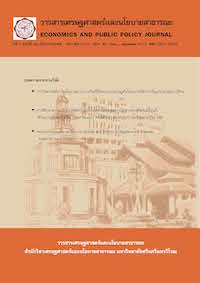Income Inequality by Income Sources and Effects of Government Transfer: Evidence from Thailand
Main Article Content
บทคัดย่อ
This paper examines income inequality in Thailand over the period 2006 and 2013 using household surveys as database and discusses effect of income transfer on poverty reduction. A decomposable inequality by income sources is adopted to analyze the contribution each income source to total inequality. Two hypotheses are proposed: i) that there was inequality reduction (measured by Gini coefficient) due to redistributive politics and entitlement program; and ii) that income transfer from government assistance was fairly well targeted with the poor household the beneficiary of income transfer. Our study reveals three results: First, there was a reduction in Gini coefficient as expected but only marginally despite huge increase in government assistance in the past decade; b) four income items were found to be characterized as inequality-augmenting whereas three income sources have inequality-dampening effect; c) there was evidence of budget leakage in the sense that the assistance was not well-targeted in that the nonpoor received a transfer as well as the poor. There seems to be possibility to improve efficiency of government assistance provided that the assistance program be targeted to poor households in the future course of development.
Article Details
ประเภทบทความ
บทความวิจัย
สงวนลิขสิทธิ์ © 2553 คณะเศรษฐศาสตร์ มหาวิทยาลัยศรีนครินทรวิโรฒ
คณะเศรษฐศาสตร์ มหาวิทยาลัยศรีนครินทรวิโรฒ จัดพิมพ์วารสารเศรษฐศาสตร์และนโยบายสาธารณะ เพื่อเผยแพร่บทความวิชาการทางเศรษฐศาสตร์ นโยบายสารธารณะ และสาขาอื่นๆที่เกี่ยวข้อง ทัศนะและข้อคิดเห็นใดๆ ที่ปรากฏในวารสารเป็นความคิดเห็นส่วนตัวของผู้เขียน โดยบทความที่ได้รับการตอบรับจะถือเป็นลิขสิทธิ์ของคณะเศรษฐศาสตร์ มหาวิทยาลัยศรีนครินทรวิโรฒ
บรรณาธิการ อาจารย์ ดร.พลพัธน์ โคตรจรัส


